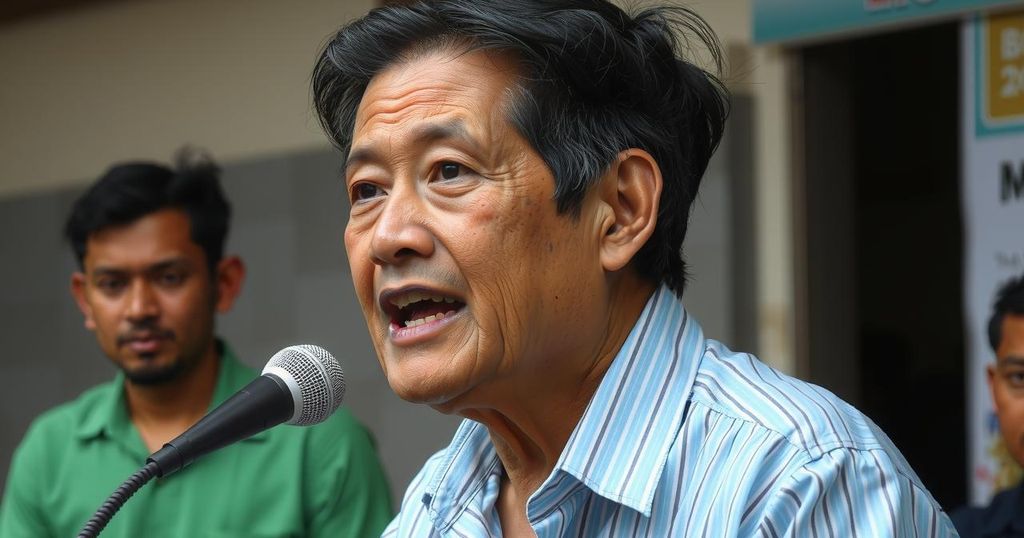The Assassination of Lim Kimya: A Stalwart Opposition Voice Silenced

Lim Kimya, a formidable critic of the Cambodian government and former CNRP member, was shot dead in Bangkok, highlighting the dangers faced by political dissidents. His activism against corruption and human rights abuses marked him as a key adversary to Prime Minister Hun Sen’s regime. His assassination raises serious concerns about the safety of opposition members in exile, emphasizing the dire political climate in Cambodia.
The assassination of Lim Kimya, a prominent Cambodian opposition politician and fierce critic of the government, has sent shockwaves through the political landscape. Shot twice in Bangkok shortly after arriving, Lim Kimya was known for his strong stand against corruption and human rights abuses perpetrated by the Cambodian authorities. His outspoken nature and refusal to remain silent on crucial issues marked him as a significant threat to the ruling Cambodian People’s Party, which has maintained power since 1979. Despite attempts to silence him, Lim Kimya continued to advocate for democratic principles until his untimely death.
A former member of the Cambodia National Rescue Party (CNRP), Lim Kimya was a dual citizen of France and Cambodia. He witnessed a substantial election success for the CNRP in 2013, winning nearly half of the National Assembly seats. However, following the party’s ban by the Supreme Court in 2017, Lim Kimya remained committed to his political beliefs and continued to voice concerns over governmental actions. His activism included accusing the Cambodian Red Cross of bias in aid distribution and criticizing the government’s handling of natural resources, highlighting the pervasive corruption within state institutions.
Born in Battambang and educated in mathematics, Lim Kimya spent years in France before returning to Cambodia, where he became a prominent figure in the opposition. He was often at the forefront of protests and public gatherings, unyielding even in the face of violent crackdowns by government forces. His last public statements included critiques of both Prime Minister Hun Sen and his family members, emphasizing the opulence displayed during public events amid widespread economic struggles.
Lim Kimya’s assassination marks a dangerous escalation for Cambodian political dissidents, particularly those residing in Thailand, where many have sought refuge from government persecution. Cambodian authorities have unequivocally denied any involvement in his death, despite the increasing threats faced by opposition figures critical of the government.
As the Cambodian political climate grows increasingly tense, Lim Kimya’s legacy as a fearless advocate for democratic ideals and human rights is becoming a symbol of resistance against authoritarianism. His untimely demise underscores the perils faced by those who challenge the status quo in Cambodia.
The circumstances surrounding Lim Kimya’s death highlight the ongoing struggles faced by Cambodian opposition politicians and activists. Following the ban of the CNRP in 2017, many leaders were forced into exile or faced violence within the country. Lim Kimya’s life and career exemplified the challenges of speaking out against a government that has long suppressed dissent, particularly under Prime Minister Hun Sen’s regime. His determination to advocate for democracy and social justice resonated with many Cambodians, positioning him as a prominent figure in the fight against corruption and human rights violations.
The assassination of Lim Kimya is a stark reminder of the risks that opposition figures in Cambodia face. His unwavering commitment to advocating for democratic values and his critiques of the ruling party have solidified his reputation as a courageous voice for change. This incident not only raises concerns regarding the safety of Cambodian activists abroad but also emphasizes the urgent need for international attention on the human rights situation within the country. Lim Kimya’s legacy will likely continue to inspire opposition movements despite the tragedy of his loss.
Original Source: www.rfa.org







